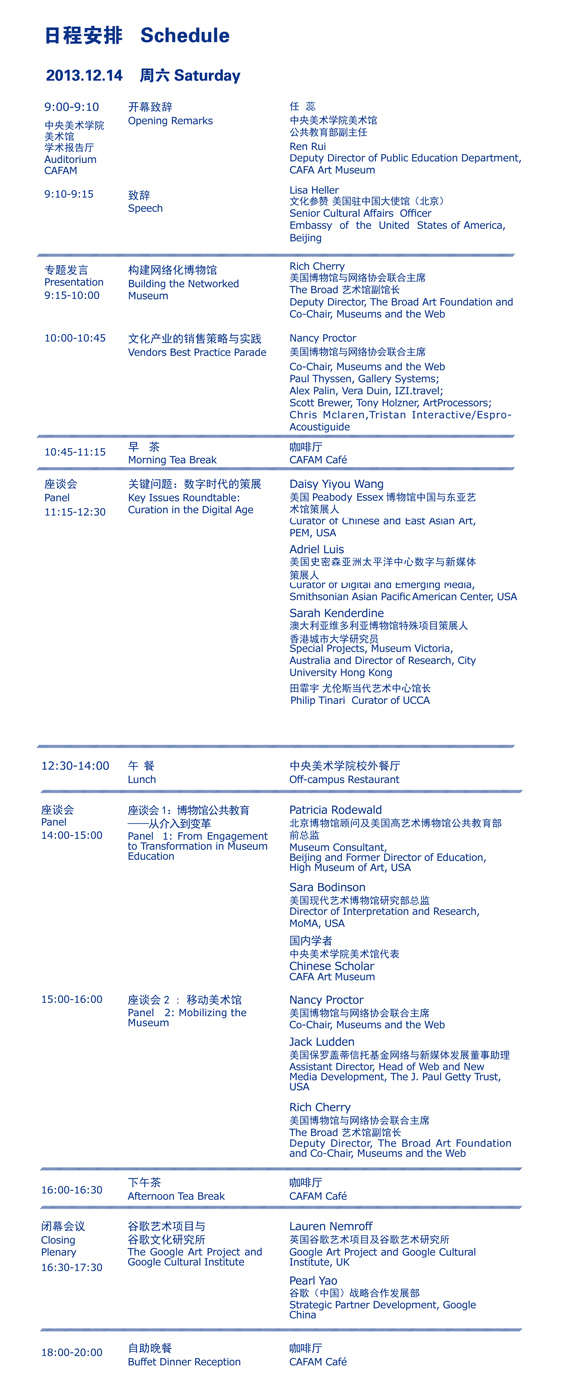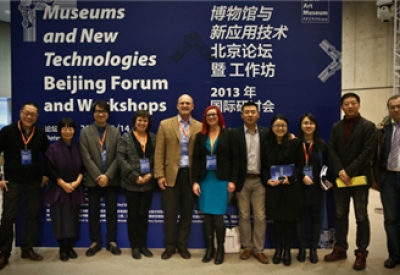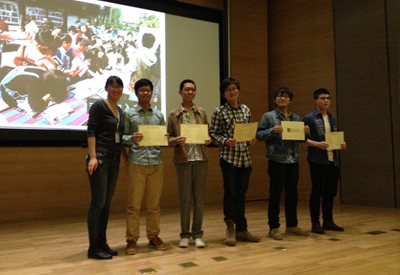
The rise of the network and digital civilization represented by the Internet is quietly changing people’s behavior and way of thinking and has even changed the people’s way of life to a great extent. The arrival of the Internet and the digital age has also increased the possibilities of adding new definitions to the museum. The major museums and art galleries in the world are also subverting the traditional display mode with the digital technology: it is the case not only for the large-scale national art units such as the National Palace Museum and the National Art Museum of China, many private art galleries, art centers and galleries are also advancing their network digitization process to varying degrees.
Top scholars, artists and museum and art gallery professionals will gather together in the “Museum and New Application Technology” Beijing Forum and Workshop to discuss the topics on the digital cultural heritage, creative practice, interactive design, mixed media, emerging technologies and so on. The interdisciplinary pioneers from different countries and regions in the world will exchange and discuss a series of cutting-edge topics such as the cultural heritage visualization, emerging technologies, and museum design.
The two-day seminar is composed of two parts: the keynote speech and the workshop. The first day will start with a keynote speech. Twelve researchers from European and American museums will discuss the critical issues of the contemporary museum technology management through a series of demonstrations and case studies, such as websites, online exhibitions and social media, educational tools, open data and open culture, customer relationship management (CRM) events and fundraising, archival and digital projects.
In the second day, the participants will be provided with opportunities through the workshop to provide specific advice and development ideas for their institutions. The potential topics include website design, mobile device strategies, indicator and web traffic analysis, educational platforms, digital publishing, digital gallery tools and social media.
The CAFA specially initiated the “Museum and New Application Technology” Beijing Forum and Workshop, the Museums and the Web International Seminar from December 14, 2013 (Saturday) to December 15 (Sunday). It invited the domestic industry colleagues to carry out exchanges and discussions. That is the first time in the art gallery circles of China to hold academic forum activities in the relevant fields, which has important historical and practical significance.
The National Specialized committee of the Art Museum, American Alliance of Museum and Networks, the CAFA Art Museum
Sponsors: The National Specialized committee of the Art Museum, American Alliance of Museum and Networks, the CAFA Art Museum
Supported by the US Embassy in China (Beijing)
Forum time: December 14 to 15, 2013
Forum site: the CAFA Art Museum


Forum Topics
December 14, 2013 (Saturday)
The Theme of the opening ceremony: Building a networked museum
The modern art museum is no longer a dusty warehouse or ivory tower but is gradually becoming an Internet node. On this network platform linking 2.7 billion users, tens of thousands of museums are providing mass information. This phenomenon is undoubtedly a warning to the museum constructors and staff.
Rich will discuss this topic based on his experience in network culture and technical construction, and will also talk about his involvement in planning and establishing the Broad Museum. The Broad is a contemporary art museum that was opened in Los Angeles in 2014. He will bring the audiences the most cutting-edge technical solutions designed for cultural institutions, covering the architectural structure of the museum and the multidisciplinary team building.
Keynote speaker: Rich Cherry
The co-chairman of the American Alliance of Museum and Networks and the deputy director of the Broad Museum
Sales strategy of the cultural industry and the practice
Unlike most museum staffs, the dealers in the cultural industry often cooperate with many different types of museums. Therefore, they have unique insight into how to make corresponding strategies in different environments, and they provide a crucial service platform for museums. In this link, the guests will share their work experience in the field of art museums.
Keynote speaker: Nancy Proctor
The co-chairman of the American Alliance of Museum and Networks
Guests: Paul Thyssen, Gallery Systems;
Alex Palin & Vera Duin, IZI.travel;
Scott Brewer & Tony Holzner, Art Processors
Chris Mclaren, Tristan Interactive/Espro-Acoustiguide
Key issues: Curation in the digital age
Now is an Internet digital age. Countless artworks are moving toward the digital informatization, and even the digital artworks have emerged. In this link, we will discuss the impact on, and the changes in curation brought about by this era background.
A roundtable discussion on the changing and transformational nature of curation in the era of the Internet, digitization, and 'born-digital' artworks.
Presenter: Daisy Yiyou Wang
The Chinese and East Asia art curator of Peabody Essex Museum
Guests: Adriel Luis
The digital and new media curator of Smithsonian Asian Pacific Center
Sarah Kenderdine
The special project curator of Victoria Museum, Australia and the researcher of City University of Hong Kong
Tian Feiyu
The director of the Ullens Center for Contemporary Art
Forum 1: The Public education of museum——from intervention to revolution
The emergence of new communication platforms and social media has undoubtedly promoted the development of museums in communication, cooperation, and display of content. In this link, educators and innovators from the frontier art museums will explore how to properly follow this trend to design more effective educational strategies and programs.
Presenter: Patricia Rodewald
The counselor of Beijing Museum and the former director of the department of public education of High Museum of Art
Guests: Sara Bodinson
The director of the research department of MoMA
Domestic scholars
The CAFA Art Museum
Forum 2: Mobile Museum
It has been more than 60 years since the museum displayed exhibits and held exhibitions with mobile technology. Jack Ludden, Rich Cherry, and Nancy Proctor will show the audiences the status of mobile applications and mobile networks in the art world today, and discuss both the content and technology issues, including location services and feedback-based design strategies.
Presenter: Nancy Proctor
The co-chairman of the American Alliance of Museum and Networks
Guests: Jack Ludden
The director assistant of the network and new media development of Paul Getty Trust Fund
Rich Cherry
The associate director of Broad Art Foundation and the co-chairman of the American Alliance of Museum and Networks
Closing meeting: Google Art Project and Google Cultural Institute
In this link, it will introduce the Google Art Project and the achievements and responses of the Google Art Institute and other organizations. The participants can present their ideas and suggestions for the development of this project and other digital museum cooperation platforms.
Keynote speaker: Lauren Nemroff
British Google Art Project and Google Art Institute
Guests: PearlYao
Google (China) Strategic Cooperation and Development Department
December 15, 2013 (Sunday)
Workshop: Cross-platform digital design
In order to get good audience feedback through the popular communication platforms nowadays, more and more museums use the “feedback design” to present the web contents. In the process of digitalization, the museum will construct a virtual way to show the exhibition content to the audiences and gain the experience of visiting the exhibition. In this process, there are three crucial core factors: the selection of communication platform, team technology, and collaboration, and audience influence. This workshop will discuss this topic and discuss how feedback design meets the needs and expectations of an audience.
Keynote speaker: Jack Ludden
The director assistant of the network and new media development of Paul Getty Trust Fund
Adriel Luis
The digital and new media curator of Smithsonian Asian Pacific Center
Workshop: Digital publishing
Susan Chun, who once worked for the Metropolitan Museum of Art, the Asia Society and the Philadelphia Museum of Art, will share her decades of work experience in the museum with the audiences and provide recommendations on how the museum can achieve the digital and multilingual publication.
Keynote speaker: Susan Chun
The American independent consultant and researcher
Workshop: Construction of the digital art museum
Keynote speaker: Wang Chun
The director of the Department of Information and Communication of the National Art Museum of China
Workshop: Beijing International Design Week and Beijing Digital Design Market
Keynote speaker: Zeng Hui
The deputy director of the committee of the Beijing International Design Week and Beijing Design Market
Overview: An in-depth observation of the Cleveland Museum of Art: Gallery One and the Art Camera Project
In the “Museum and Network”, an “in-depth observation” of the Gallery One and Art Camera project at the Cleveland Museum of Art was conducted. In this link, it will present the results of the survey to the audiences. On September 18, 19 this year, more than 50 museum professionals from all over the world gathered at the Cleveland Museum of Art to attend the lectures, seminars, and workshops. The digital publication of this event is about to be released, and Nancy and Susan will share their views and opinions with the audiences.
Keynote speaker: Nancy Proctor
The co-chairman of the American Alliance of Museum and Networks
Susan Chun
The American independent consultant and researcher
Workshop: Service and Audio Guide of the Public Wechat Platform of Art Museums
Keynote speaker: Sun Limei
The deputy director of the Information Network Department of the National Museum of China
Liu Jun
The section chief of the Website Office of the Information Network Department of the National Museum of China
Workshop: “Video Production 101” Project Sharing
The costs for art institutions to create their videos will be much lower than they thought. The creation based on the unconventional techniques can produce a relatively casual communication mode and make it easier for visitors to understand their contents. How to develop the acceptable unique content in a low-cost text editing mode? The reflections on the content, circumstances, and methods of communication will provide a fundamental solution for this.
Keynote speaker: Anna ChiarettaLavatelli
The manager of the online video-producing project of the Balboa Park
Workshop: The new trend of the digital cooperation
How does the museum carry on research, design, development and carry out the cross digital platform projects through collaboration and interaction? This workshop will discuss this issue step-by-step and provide an overview. Through the case studies of the MoMA and the High Museum of Art, the workshop will also emphasize the importance of the guided audience surveys in the development of the project, and provide specific examples to discuss how the user feedback exerts a lasting effect on the development of the digital products in the cycle period.
Keynote speaker: Sara Bodinson
The director of the Research Department of the MoMA
Patricia Rodewald
The Consultant of Beijing Museum and the former director of the Department of Public Education, High Museum of Art
Workshop: The “Immersive” Experience of the Digital Museum
This workshop will give an overview of the following two aspects: the cutting-edge technologies in the cultural space and the digital thinking about the “immersive” personal experiences. This dialogue will demonstrate the recent projects of the art museum, the library, the innovation research center of the archives center and museum (iGLAM), and the interactive visual and application laboratory (ALiVE) of the City University of Hong Kong by recording the diverse datasets of the tangible cultural heritage and the intangible culture heritage.
Keynote speaker: Sarah Kenderdine
The special planner of the Victoria Museum, Australia and the Director of Teaching Research of the City University of Hong Kong
Workshop: Digital Application and Research of the Cultural Heritage
Keynote speaker: Yan Feng
The director of the National Digital Media Research Center of the CAFA and the director of the Interaction Design Laboratory of the CAFA
Workshop: Future Digital Art Museum
In the age of information, human needs for the information and interaction far beyond the past. The art museum, as an essential carrier of the public education of art, faces a transformation from one-way artistic aesthetics output to two-way interaction with visitors. This kind of two-way communication can collect feedback and data from the audiences on the one hand, and it can make the popularization of aesthetic education more targeted and effective on the other side. We will show the common research practices of the CAFA Art Museum: the technology is no longer an obstacle, there is no distance to the art, and everyone will love the art museums.
Keynote speaker: Tang Bin
The deputy director of the CAFA Art Museum
Li Wenlong
The industrial design teacher of the CAFA
Chen Weiping
The lecturer of the Department of Design of the CAFA
Closing meeting: Question and answer
In this link, the participants can raise questions to all the experts in any aspect of the previous two days of speeches and discussions, and also discuss topics that have not yet been involved. At the same time, other museum staff and social media are welcome to participate in the dialogue. It expected that more information resources and innovative thinking would emerge at the final stage.
Presenter: Rich Cherry
The associate director of the Broad Art Foundation and the co-chairman of the American Alliance of Museum and Networks
Summary speech: Fan Di’an
The director of the National Art Museum of China and the director of the specialized committee of the national museum
Wang Huangsheng
The director of the CAFA Art Museum and the deputy director of the specialized committee of the national museum
Forum speaker and guests: Chairs and Panelists
Fan Di’an, the director of the National Art Museum of China and the director of the specialized committee of the national museum
Wang Huangsheng, the director of the CAFA Art Museum and the deputy director of the specialized committee of the national museum
Zeng Hui, the deputy director of the committee of the Beijing International Design Week and Beijing Design Market
Sun Limei, the deputy director of the Information Network Department of the National Museum of China
Liu Jun, the section chief of the Website Office of the Information Network Department of the National Museum of China
Wang Chun, the director of the Department of Information and Communication of the National Art Museum of China
Ge Yi, the project manager of the Department of Information and Communication of the National Art Museum of China
Tang Bin, the deputy director of the CAFA Art Museum
Ren Rui, the deputy director of the Department of Public Education of the CAFA Art Museum
Yan Feng, the director of the National Digital Media Research Center of the CAFA and the director of the Interaction Design Laboratory of the CAFA
Li Wenlong, the industrial design teacher of the CAFA, the initiator of “Mr. A”
Chen Weiping, the lecturer of the Department of Design of the CAFA
Rich Cherry, the co-chairman of the American Alliance of Museum and Networks and the deputy director of the Broad Museum, responsible for supervising the operation management of the Broad and supporting the planning and construction of the Broad. Lead the museum on planning, recruitment, and operations, and focus on the operations, marketing, technology, finance, security, collections, and visitor services.
Nancy Proctor, the co-chairman of the American Alliance of Museum and Networks. He served as the project chairman at the 2010-2011 Museum Computer Network Conference, managed the podcast series of MuseumMobile.Info, and served as the digital curation editor for The Museum Journal.
Adriel Luis, the digital and new media curator of Smithsonian Asian Pacific Center. As the first digital curator at Smithsonian, Luis focuses on discovering the new ways of creating and consuming art, history, and culture.
Anna ChiarettaLavatelli, the manager of the online video-producing project of the Balboa Park. As the manager of the online video-producing project of the Balboa Park, Lavatelli manages the online video projects; as a consultant, she also provides support on video processing, installation technology, and equipment purchase for art museums and individual artists.
Daisy Yiyou Wang, the Chinese and East Asia art curator of Peabody Essex Museum. Yiyou Wang has dabbled in various forms of the traditional and contemporary art collections and has won the museum leader’s bonus of the Getty Foundation, the Smithson post-doctoral bonus and the Smithson bonus for “carrying forward the world culture”.
Jennifer Mundy, the director of the Research Department of Tate, responsible for carrying out the strategy and management research project for the collections of Tate.
Jack Ludden, the director assistant of the network and new media development of Paul Getty Trust Fund. Ludden assists in defining the strategic vision of Getty through the Internet and other new media, and his team supports Getty to present its content to the digital distribution channels. Lauren Nemroff, British Google Art Project, and Google Art Institute.
Patricia Rodewald, the counselor of Beijing Museum and the former director of the department of public education of High Museum of Art
Philip Tinari, the director of the Ullens Center for Contemporary Art
Pearl Yao, Google (China) Strategic Cooperation and Development Department
Sara Bodinson, the director of the Interpretation and Research Department of MOMA
Sarah Kenderdine, the special project curator of Victoria Museum, Australia and the researcher of the City University of Hong Kong. Kenderdine’s research directions focus mainly on the interactive and immersive frontier experience of museums and galleries, which made him the pioneer of the three-dimensional presentation system and content creation.
Susan Chun, the American independent consultant, and researcher, and the researcher and consultant of the cultural heritage organization. Proficient in publishing, information management, collections, cultural data analysis, intellectual property policies and multilingual development and management
Chief planner: Wang Huangsheng
Co-ordinator: Tang Bin
Planner: Ren Rui, Patricia Rodewald, Fang Miner
Project development and coordination: Nancy Proctor, Rich Cherry, Hiroko Kusano, Titus Bicknell
Project leader: Ren Rui
Conference coordination: Fang Miner
Administrative coordination: Yuan Rui, Jiang Guijie, Yang Liu
Guest reception: Tian Xiaoyun, Li Yingtian
Media reception: He Yisha, Du Yinzhu
Equipment support: Sun Wei, Guo Xu
Safety guarantee: Chen Xiaohua, Zhu Yongkang
Photography and video recording: Ding Yi, Dong Huiping, Quan Jing
Designer: Yi Yiliang
Tag: Museum&Web

2012-02-17

2013-12-16

2014-10-13
